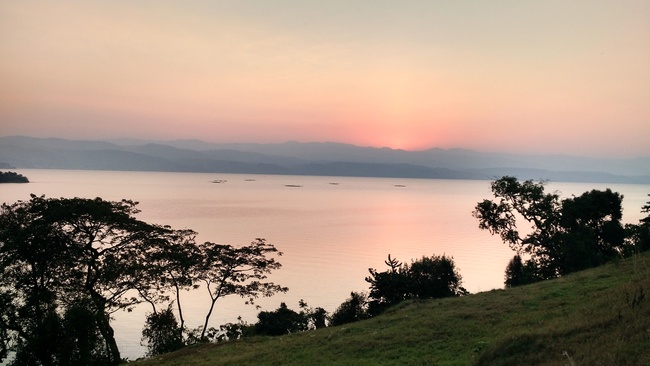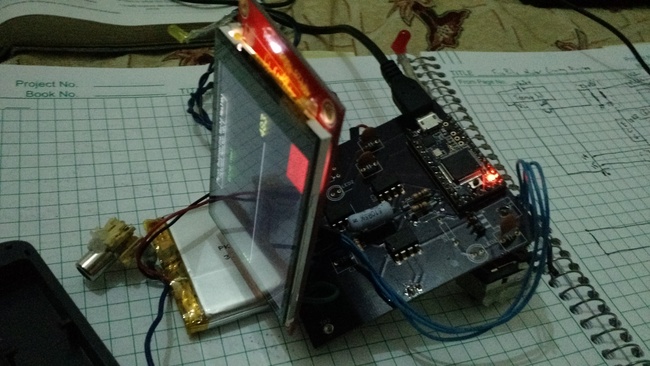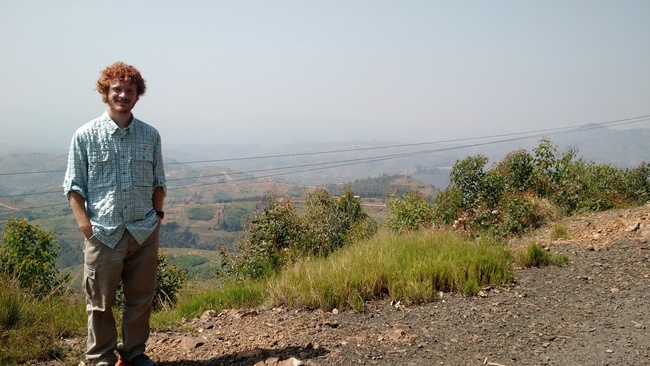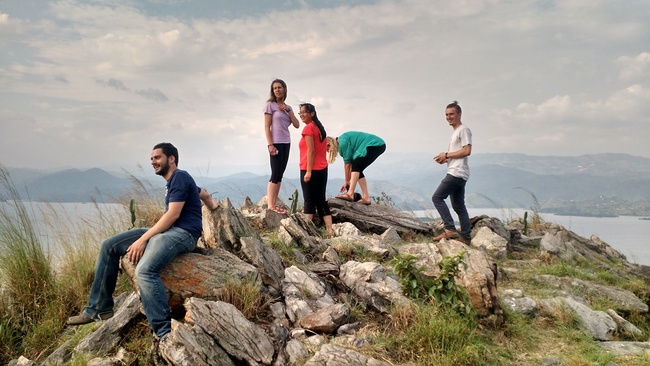Urugendo Ruhire

Watching from the shores of Kamembe, Rwanda, as the sun sets behind the hills of the Congo.
In two weeks, I have logged approximately 42 hours in buses. I’ve been to every corner of Rwanda, from the flat and dry pastureland of Nyagatare to the beautiful lakeside border town of Kamembe. I’ve been to eight different hospitals and seen all 16 current students in the Summer Institute overcome a huge variety of issues, ranging from too few technicians to too many, ancient medical equipment or devices so high-tech they can’t even function in developing world environments, and more. If last summer was an intense case study in my hospital, this summer is a zoomed-out perspective on healthcare across Rwanda at every tier of the medical hierarchy.
Rwanda’s medical system is arranged in a decentralized fashion: there are big referral hospitals which service several smaller (and less well-equipped) district hospitals, and each of these district hospitals services 10-12 health clinics or dispensaries. The idea behind this system is that the primary care cases such as first aid and preventative medicine are relegated to a local health clinic, while more severe cases are sent to the district hospitals. If the patient’s condition is beyond the capabilities of the district hospital, they are then sent to the referral hospital for the region. While hospitals are still bursting with people, this system streamlines healthcare and allows hospitals to more efficiently take care of patients. And when you’re a country that’s slightly smaller than Maryland and has a population of almost 12 million people, efficiency matters!
I am incredibly blessed to have such a unique view into Rwanda’s healthcare system. As a biomedical engineer who wants to focus on building technology for developing world medical environments, I am experiencing a once-in-a-lifetime kind of immersion that is allowing me to start identifying needs and ways that I can meet them. Furthermore, coming here with my low-cost patient monitor alpha is helping to direct my conversations with doctors and technicians, and I am slowly refining the product based upon the feedback I’ve been getting. It’s almost a surreal experience, developing a product and then being able to walk to the nearest hospital and ask doctors what they think of it.

Late night adjustments to the patient monitor. Who says you can’t build electronics in Rwanda?
For a moment, though, I will put up this macroscopic view; while much of this trip is a bird’s eye view of a hugely complex system, it is certainly not the only aspect of Rwanda worth noting. As I hope I have conveyed from last year’s entries, Rwanda is an incredibly beautiful country full of some of the most brave, forgiving, hardworking, and friendly people I have ever met. From my friend Junior, who took a moto down to the hospital just to say hi to me while I was passing through town; Costica, a brilliant biomedical technician (BMET) who teaches other students about how to repair medical equipment and helps almost every hospital in the country, and yet somehow found the time to drive me to Kibuye and indulge me in my tourist photo impulses; Francis, the BMET at my hospital last year who never fails to make me laugh and works tirelessly to fix equipment in the face of glaring administrative hurdles; and the list goes on.

On the road to Kibuye. Photo credit: Costica!
Of course, Rwandans aren’t the only amazing people I have met. Along the way, I’ve gotten to know all 16 of the students participating in the Summer Institute this year, and they are an incredible group of people. I am continually inspired by seeing how many of my fellow engineers have the smarts, generosity, and compassion to give up their summers and work in these developing world environments. This year’s group hails from all over the world, and yet their diversity has made some incredible teams with unique perspectives. I’ve visited every group once so far, and I am confident that they are not only fixing equipment but also making an impact on the people around them and spreading a light. It’s not hard to be a coordinator when you work with such fantastic people.

Just a few of the super cool participants from this year. They look like the cast of a spin-off LOST series.
There are two weeks left before I head back to the United States and a whole lot to do before that day arrives. While I’m busy, I absolutely love working in this environment with all of these people, and I can’t wait to see what adventures the next two weeks will bring. Urugendo ruhire means “bon voyage” in Kinyarwanda, and as I log another 42 hours of bus rides in the next two weeks (round two!), I will be eagerly anticipating what it is God has in store and working to always keep an open heart and open mind.